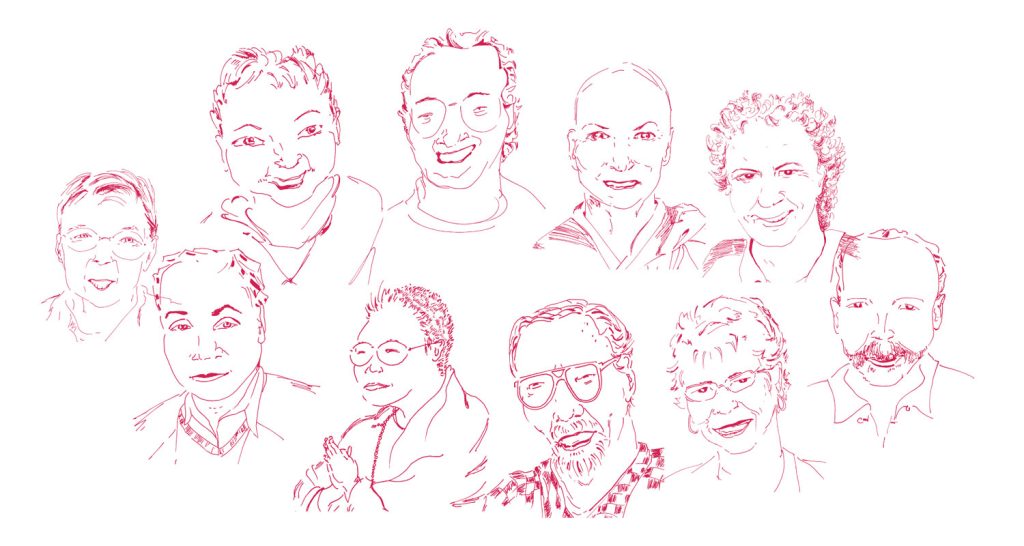As students of Buddhism, we try to be good people. In our practice, we try to cultivate the paramitas— patience, generosity, exertion, and the like—for these are essential to a well-lived life. And not only do we try to be good people living a good life; we aspire to be enlightened people living an enlightened life. But let’s face it: most of the time we’re greedy, crazy, and full of ourselves, just like everyone else.
We are, after all, deluded beings. We make mistakes, including mistakes in how we tread the path. Some of them are enormous, some of them are silly, some of them are enormously silly. We are human beings. We suffer, like Hamlet, the slings and arrows of our outrageous fortunes, to say nothing of the heartache and the thousand natural shocks that flesh is heir to.
But sometimes it is precisely such things—our mistakes, our shortcomings, our misfortunes—that are the source of our best learning. We at Tricycle thought that in our second annual Tricycle Question we would try to shine more light on this side of practice. We asked ten practitioners and teachers to share their experience.
So here is our question:
How has a mistake, shortcoming, or misfortune enriched your Buddhist practice?
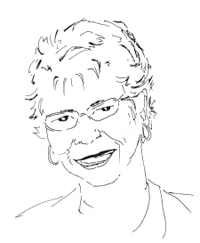 Susan Moon
Susan Moon
I have heard people say, “The first time I sat down in the zendo, I knew I was home.” That certainly didn’t happen to me. Over thirty-five years ago, soon after I paid my first visit to the Berkeley Zen Center, there was a one-day sitting, and Abbot Mel Weitsman suggested to me that, since I was a beginner, I could just sit in the morning and leave at lunch. The minutes stretched out into aeons, my knees hurt, and my mind hurt even worse. What was I doing there? I must be crazy! I wanted to find the deepest truth, and they were telling me to count my breaths! I was claustrophobic in the tiny attic—hot, dizzy, overcome by waves of nausea. Everything went black, and I had to put my head down on the floor in front of me.
When I got home, my housemate asked me how the sitting was. I said it was the hardest thing I’d ever done in my life.
“Really?” he said. “What’s so hard about sitting quietly on a cushion for a few hours?”
But I kept at it. I love the teachings of Shantideva, the koans, Dogen. I love bowing, incense, chanting, oryoki meals. And I love the idea of zazen, of quiet contemplation.
Many years after that first one-day sitting, I bought myself a sitting robe and went to a three-month practice period at the Tassajara Zen Mountain Monastery, in northern California. I loved everything about it except sitting zazen, the heart of our practice. Period after period, I wrestled with my monkey mind, left off counting breaths to count how many states I’d been through the night before, searched for meaning, gave up, tried again. During breaks, I sat in the garden and wept.
Then I read of the ancient Chinese Zen master who told his student, “To wear this robe and not understand the great matter is the greatest misery.” This was a comfort! That old Chan master knew how I felt. I wasn’t alone.
Susan Moon, a Soto Zen teacher, is the author of “The Life and Letters of Tofu Roshi” and editor of “Not Turning Away: The Practice of Engaged Buddhism.”
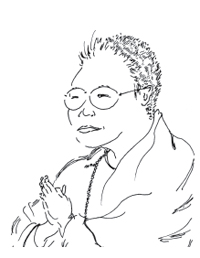 Mushim Ikeda-Nash
Mushim Ikeda-Nash
In August 1988, I returned from eight months of monastic Zen practice on a mountain in South Korea. When I landed at the airport in San Francisco, my head was shaved, I was wearing gray monastic robes, I had around fifteen dollars in cash and no savings, and I was pregnant. Since the order into which I’d been ordained was celibate, getting pregnant was most definitely a mistake, revealing some deep shortcomings in both the monastic system and my own ability to keep the precepts, and resulting in the misfortune of having to contemplate getting an abortion. Most people I knew agreed that this would be the sensible thing to do.
But I just couldn’t bear to. I figured I needed to find a way to continue with my practice and find work, and that’s what I did. When I was five months pregnant, I sat the Rohatsu sesshin on Mount Baldy with Kyozan Joshu Sasaki Roshi. He gave me the koan “How do you manifest true nature as baby?” He also said, “You must educate baby!”
I’d read that if you stick out your tongue at a newborn, the baby will imitate you. “This may be the only chance I have to give it a try!” I thought the day my son was born. I stuck out my tongue and my son mirrored me without hesitation, thrusting out a tongue the size of a raspberry. He looked slightly amused and very tired and relieved to have made it into this next round of existence. I knew at that moment that this “mistake” had resulted in the happiest moment of my life.
But I was mistaken again. Each moment afterward has been even better. As I write this I have the flu, so I’m languishing and being cared for by my twenty-year-old. He’s frying an egg for me and making some toast!
Mushim Ikeda-Nash leads meditation retreats for people of color at Vallecitos Mountain Refuge, Manzanita Village, and Spirit Rock Meditation Center in California, and is a core teacher at the East Bay Meditation Center in Oakland.
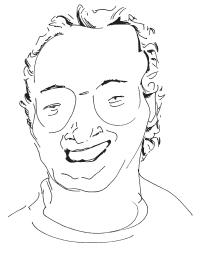 Andrew Cooper
Andrew Cooper
My failure to accomplish or attain any of what I had hoped I would when I set out on the Buddhist path is, I think, the thing that has most enriched my practice, such as it is.
Andrew Cooper is a contributing editor at Tricycle.
Joan Halifax
“When you see something, shine through it; when you hear, shine through what you are hearing; shine through the five skandhas; shine through the six fields of sense perception—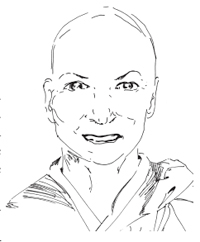 in front, behind, left and right, through seven calamities and eight disasters, become one with radiant vision of the whole body. See through all things, internal and external; shine through them. When this work becomes solid, then perception of reality will be perfectly, distinctly clear, just like looking at the palm of your hand.
in front, behind, left and right, through seven calamities and eight disasters, become one with radiant vision of the whole body. See through all things, internal and external; shine through them. When this work becomes solid, then perception of reality will be perfectly, distinctly clear, just like looking at the palm of your hand.
“At this point, while increasing the use of this clear knowing and insight, if you enter awakening, then shine through awakening. If you get into agreeable circumstances, then shine through agreeable circumstances. If you fall into adverse situations, then shine through adverse situations. When greed or desire arise, shine through greed and desire; when hatred or anger arise, shine through hatred and anger; when you act out of ignorance, shine through ignorance. When the three poisons of hatred, greed, and ignorance are no more, and the mind is pure, shine through that pure mind. At all times, in all places, be it desires, senses, gain, loss, right, wrong, visions of Buddha or of dharma, in all things shine through with your whole body.
—Hakuin’s “Four Ways of Knowing”
One time, my first Zen teacher said: “Good karma is bad karma; bad karma is good karma.” Little did I realize how accurate he was. Thus I welcome every adversity.
Joan Halifax is the founder, abbot, and head teacher of Upaya Zen Center, in Santa Fe, New Mexico.
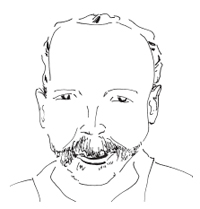 Lin Jensen
Lin Jensen
I had the goods on my father and pressed my advantage to the fullest. Out of misguided national pride, Father had offered a visitor from his Danish homeland a higher salary than he’d ever paid any of the farmhands who’d worked for him for years, and they’d noticed: “I guess you’ve got to speak Danish to get a raise,” was the way they put it. I told him off and he folded because I was right and he was wrong.
The showdown took place in the hallway between the bedrooms and the bathroom. I was on my way to the fields to work. I was sixteen at the time, and had never talked back before. Father would shut me up, saying, “I don’t want another word out of you,” and he’d mean it. Another word would result in a beating that left welts on my butt for weeks. Father had just gotten up and was still in his pajamas. Why I chose this time, I don’t know. I guess I’d been waiting in ambush for just such a moment. A father in pajamas is no match for a grown son in field pants and boots.
I can be hard to take when I’m wrong, but I’m often insufferable when I’m right. It doesn’t help much to be right. I’ve learned that much about life, thanks to the pain and embarrassment that played out in the face of a man cornered in the hallway in his pajamas.
Lin Jensen is the Senior Buddhist Chaplain at High Desert State Prison, in Susanville, California. His most recent book is “Together Under One Roof: Making a Home of the Buddha’s Household.”
Pico Iyer
My biggest mistake, of course, was thinking I wanted to pursue Buddhism. I had just discovered Asia and its ravishing aesthetics, and I knew that the regular life around me on 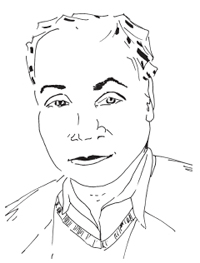 the twenty-fifth floor of a midtown Manhattan office building wasn’t very real at all. But in my youth, eager to idealize the road less traveled, I was sure that whatever was the opposite of the unreal must, by definition, be real. So I took myself off to a temple on the backstreets of Kyoto, where I learned very soon all that Buddhism wasn’t: my projections, my romances, my delicate ideas of it. Solid ground, hard work, and fullbodied commitment to the moment seemed more the thing in a Zen setting.
the twenty-fifth floor of a midtown Manhattan office building wasn’t very real at all. But in my youth, eager to idealize the road less traveled, I was sure that whatever was the opposite of the unreal must, by definition, be real. So I took myself off to a temple on the backstreets of Kyoto, where I learned very soon all that Buddhism wasn’t: my projections, my romances, my delicate ideas of it. Solid ground, hard work, and fullbodied commitment to the moment seemed more the thing in a Zen setting.
I had thought it was important to become something; following my mistake suggested that it was important only to be something. I had imagined moonlit haiku on the meditation platform and strokes of wisdom from the wooden stick; I found that Buddhism in a living form seemed to be taking place much more approachably among those matrons munching “Moon-Viewing” burgers in the Golden Arches or those kids taught in the video-game arcade to think of others before themselves.
I couldn’t have known better, I suppose. I was born in England, to Hindu parents, and Buddhism, seen from there, was exoticism, a cool way of dropping out and even of rebranding oneself (while wondering what kind of “self” really exists).
Yet half a lifetime later, I’ve never left the vicinity of Kyoto, and I find myself in a room, a life, more monastic than any I could have imagined in my little temple space. My elderly friends at the ping-pong table teach me how to keep my eye on the ball. The girl at the 7-Eleven offers compassion by putting ice in my shopping bag so my eclair won’t melt. No texts or lofty ideas seem to be in the vicinity at all. It’s only our mistakes, my neighbors are suggesting, that bring us to the place where we should have been all along. Thinking I might be interested in Buddhism helped me understand how much I could learn from not being interested in it at all.
Pico Iyer’s most recent book is “The Open Road: The Global Journey of the Fourteenth Dalai Lama.”
Sylvia Boorstein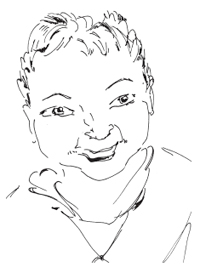
All worrying is gratuitous. (Concern, when things need to be addressed and something can be done, is valuable.) Compulsive fretting—“What if this…?” “What if that…?”—the result of the imagination stretching to read a situation as problematic is, I think, a form of obsessive-compulsive illness and probably derives from genes and circumstances of life. I think of it as a form of the traditional hindrance of restlessness. The mind, jumpy with energy, develops ideas of calamity.
My parents weren’t fretters, nor, as far as I recall, were theirs. I see myself as a recovering fretter. The turning point in my life was my realization as an adult that the fretting was a habit associated with my mind. Habits, when recognized clearly, can be changed. To a significant degree, I’ve changed my mind. When I’m tired or confused, I might fret, but I catch it soon, and then I can stop. Since I am sure that the habit is a mind glitch that is part of my karma and not a moral flaw, I don’t need to be embarrassed about it any more. I have brown eyes, I sometimes worry, and I’m short. That’s all.
Sylvia Boorstein is a founding teacher of Spirit Rock Meditation Center, in Marin County, California. Her most recent book is “Happiness Is an Inside Job: Practicing for a Joyful Life.”
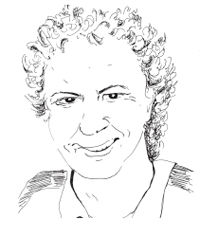 Jeff Greenwald
Jeff Greenwald
As a travel journalist, I find that maintaining mindfulness on the road, while facing the frustrations that inevitably beset the traveler, is a continual challenge. There are constant opportunities for missteps, descents into anger, greed, ignorance, desire, or pride. Such episodes might occur in an American airport, on a stalled bus in Mali, or in the Chinese vegetarian restaurant where I was served horsehead soup.
Ten years ago, in Laos, I fell into a heated argument with a riverboat pilot who wanted to charge me twice the local fare—500 kip—for my passage across the Mekong. I fretted and growled and argued for a full ten minutes before awakening to the fact that (1) I was arguing over seven cents, and (2) I really did weigh twice as much as a Lao. A similar incident occurred in Thailand, where a shopkeeper raised my ire by charging me a few baht more than his last customer—an elderly woman—for bottled water. After much self-righteous dukkha [suffering], I learned that he’d given a discount to his mother.
Missed connections, visa snafus, the language barrier— I’ve lost my cool over all of these, and so much more. Each time, I emerge with the realization that a few mindful breaths can always turn exasperation into practice. Someday I hope to internalize this knowledge and embrace the phrase carried by Tibetans on the arduous pilgrimage to Kailash: Kha zher, lam khyer, “Whatever happens, whatever arises, bring it to the path.”
Jeff Greenwald is a contributing editor at Tricycle and the author of “Shopping for Buddhas.”
Martine Batchelor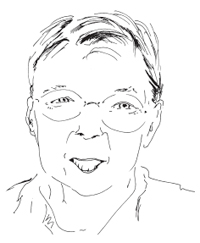
As a young nun in Korea, I had to take care of the occasional Western visitors and answer their questions about Buddhism. One of my difficulties was remembering all the lists of Buddhist terms. One afternoon I found myself trying to explain (and remember) the Four Noble Truths. I was relieved that I could at least remember the first two—suffering and craving—but I could not recall the third one. Then, just as it was on the tip of my tongue, I noticed a monk taking a bucket of persimmons that I had spent most of the afternoon picking. I leapt up, wrenched the bucket from his hand, and told him in no uncertain terms to whom these persimmons belonged. By the time I returned to my guests, I had remembered the last two truths—the cessation of craving and the cultivation of the eightfold path.
After the visitors had left, a nun who had observed the whole scene asked me if I had noticed anything. “Noticed what?’ I asked. “Your behavior,” she replied. “What behavior?” “Well, you became very angry about the persimmons while you were explaining the Four Noble Truths. It was a little strange.” Only when she mentioned it did I become aware of what I had done. I had reacted unthinkingly and blindly to the “theft” of “my” persimmons—pure craving in action!
Martine Batchelor, the author of “Women in Korean Zen,” was a Zen nun in Korea for ten years. She teaches meditation worldwide. Her latest book is “Let Go: A Buddhist Guide to Breaking Free of Habits.”
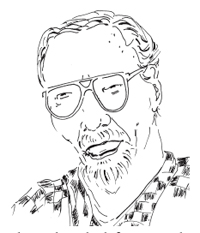 Robert Aitken
Robert Aitken
Once, at dokusan [teacher interview] time, someone came to see me in tears. I said sympathetically, “What’s the matter?” She told me that she was upset about her practice. I assured her that she was doing fine. She calmed down, but she left our sangha after a short while and joined a group with a different kind of practice. Later, we met socially, and she told me that when she had come to me in tears, she had been overwhelmed by Mu—her first koan—and had felt that she was on the verge of something. I realized that I had misunderstood her weeping and had missed a chance to help her across. I should have shouted, “What is Mu! What is Mu!” After that I was much more careful to respond appropriately when someone came to me in tears for dokusan.
Robert Aitken is a retired master of the Diamond Sangha, a Zen Buddhist society in Honolulu, Hawaii. He is also a cofounder of the Buddhist Peace Fellowship.
Jeff Wilson
Misfortune and shortcomings are precisely where Buddhism shifts from abstract theory into existential reality. This has hit home for me in the great difficulties my wife and I have experienced with past pregnancies: a terrifying ectopic pregnancy, the near-fatal birth of our son, and a sudden miscarriage. Through these hardships and my inability to do anything to prevent or alleviate them, I have come to understand why the Buddha included birth (along with aging, sickness, and death) among the four fundamental realms of suffering. The last three are easy to understand, and I have seen each of them up close in my life. But we tend to regard birth as a joyous occasion. The suffering of birth is harder to acknowledge, but to deny it would be untrue. The suffering of birth was brought home to me only after seeing for myself how dangerous and beyond our control pregnancy and birth can be.
Without these kinds of personal sufferings or awareness of our fundamental shortcomings, we may think of Buddhism as a process of becoming ever happier and more peaceful, of expanding our minds into the infinite or reveling in the play of interconnection. But many of the Buddha’s most important insights were hard, with razor-sharp edges. The truths that the Buddha nobly pronounced speak of harsh realities: if we live long enough, we will find that what we love dies while we stand helpless, and what we hope for fades unborn. And yet, too, terrible birth pains may bring forth love and happiness. Birth is suffering and, often, inexpressible joy. To say otherwise would also be untrue.
Jeff Wilson is an assistant professor of Religious Studies and East Asian Studies at Renison College, in Waterloo, Ontario, and a contributing editor at Tricycle.
Roshi Pat Enkyo O’Hara
It is with both shame and more than a little embarrassment that I remember my years of drug use. What had started out as a sincere attempt to gain insight and clarity—to open the doors of perception and attain cosmic consciousness!—through the use of psychedelics led in time to a downward spiral of uppers, downers, soporifics, and booze. The degrading experience of substance abuse and addiction has enriched my practice and understanding more deeply than any other episode in my life. Nothing has helped me more in realizing and sharing the complexities and simplicity of the Buddhist teachings.
I learned a lot about how easy it is to fool ourselves. I thought I was moving toward lucidity and understanding, but actually I was drifting into darkness and danger. I now have a distrust of easy fixes, be they promises of instant insight or of transformational makeovers. In positive terms, I’ve come to deeply value well-rooted traditions, both eastern contemplative and western psychological. There’s such power in simple daily meditation, honest reflection, and unadorned reverence.
Was my early experience a misfortune or a blessing? When I look into the eyes of a troubled seeker, when I hear of a violent act, when I see the injustice woven into our world, I am thankful for the insight that our demons live entwined with our noblest desires and that, for compassion to be served, judgments based on a sense of moral superiority must be set aside.
Roshi Pat Enkyo O’Hara is the abbot of the Village Zendo in New York City.
Stephan Bodian
For twenty years now I’ve had a health condition known as multiple chemical sensitivities, which limits the places and people I can visit and the events I can attend. I’m sickened by many of the items, like carpeting and furniture, that fill most homes and public spaces and by the personal care products that most people wear, and I find that ordinary tasks like shopping, eating in restaurants, staying in hotels, even reading books can seem like extraordinary challenges.
Needless to say, I’ve had my share of anxiety, anger, and grief over my limitations. But at the same time, they’ve been a powerful and relentless teacher, reminding me of my mortality and inviting me again and again to let go of my expectations of how life should be, and to release my identification with the body and the self-construct I keep resurrecting and take to be me.
My health condition repeatedly prevents me from doing what I feel moved to do and strips me of any illusion that I’m in control of my life. I’m regularly confronted with the wise teachings of the Buddha, who advises us to find true happiness not in pleasure or accomplishment, but in the deathless. Deprived of many of the options that most people have, I find that my life is monastic in its simplicity—and I feel profoundly grateful for this precious moment.
Stephan Bodian is a teacher in the Zen and Advaita Vedanta traditions and the author of “Wake Up Now.”
Wes Nisker
When I considered the question about a mistake, misfortune, or shortcoming that might have enriched my Buddhist practice, what immediately came to mind are the basic shortcomings of life on earth. In fact, the mistakes of evolution are the only reason that I have a practice in the first place, and the only reason I even need a practice. If the adaptations of the growing primate brain would have included a built-in mindfulness, or perhaps a less obstinate package of desires, fears, and basic mishugas, I might never have seated myself on a zafu. How many of us would keep on sitting gratuitously, just for sitting’s sake?
Maybe our collective sitting practices will eventually correct the mistakes of evolution. Perhaps the efforts of all the world’s Buddhists will somehow manage to tweak the genome and create beings who are by nature mindful; who are born with full-on, selfless, moment-to-moment lovingkindness and compassion.
Evolutionary science, however, would remind us that desire, aggression, anxiety, and self-involvement all served essential survival functions for our ancestors on the African savannah and for a long time after. If those traits are still necessary for our current survival, then humans who practice diminishing the strength of those functions are placing themselves at risk. So Buddhists may well be on the way to extinction! If that is the case, you might as well enjoy the dharma here and now. And be sure to give a deep bow to evolution for enriching your practice.
Wes Nisker is a teacher at Spirit Rock Meditation Center in Marin County, California. He is an author and performer, and the founder and coeditor of the Buddhist journal Inquiring Mind.
Lý Quốc Phú
When I first involved myself in the Buddhist community, I started a meditation group with two kind and generous friends schooled in vipassana meditation as taught in the tradition of Sayagyi U Ba Khin. I was not a nice person. I was mean, calculating and manipulative. My friends and I disagreed on a number of issues, and lacking any knowledge of conflict mediation, I bullied them until they left.
The effects of that hostility stayed with me for years, even as it flowed into remorse. I could not bring myself to reflect on those earlier days without cringing with regret. I practiced several letters of apology, but sincerity was still lacking. Eventually I thought I might find my way to sincerity at the same kind of vipassana retreat that had so profoundly influenced my friends, and which I had previously belittled with baseless ridicule.
The retreat was a most humbling experience. Years of meditation had taught me to sit with comfort, but my mind flew about like an uncaged bird. I had never gone so long without speaking a word. But by the eleventh day, I had cultivated a foundation of concentration and mindfulness unlike anything I had ever experienced. In my final letter of apology, I wrote to thank my friends for the exceptional kindness they afforded me even when I had scorned them. After all, it was the seeds of their experience and kindness that led me out of my anger to a practice rooted in mindfulness and equanimity.
Lý Quốc Phú has been a grassroots organizer in the Buddhist community since his teens. He has organized meditation groups, campus clubs, youth retreats, and a basketball team. He currently contributes to the blog Dharma Folk.
Thank you for subscribing to Tricycle! As a nonprofit, we depend on readers like you to keep Buddhist teachings and practices widely available.
